Unit 6. HEALTH MATTERS

6.1. Improve Your Listening Skills
Assignment 1. Listen to the recording to Unit 6. Which is the problem Ed has? What symptoms are described? On the Internet Ed found some information – how helpful was it?
Listen to the recording again and jot down the words and expressions, which the speakers define and exemplify after their dialogue. Find their Russian equivalents.
Assignment 2. And write down the dialogue ‘At the Doctor’s’.
6.2 Vocabulary Enrichment
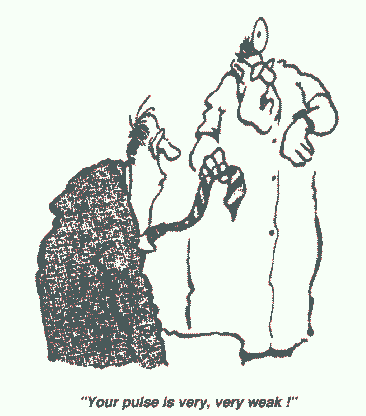
Assignment 1. Complete these words. The first letter is given. They are all parts of the body.
- T (you have one on each hand)
- L (two parts of your mouth)
- E (you hear with these)
- G (your teeth grow in them)
- E (the middle part of your arm)
- S (the part under your foot)
- H (Achilles had a problem with this)
- K (a joint in your leg)
- C (the part below your mouth)
- S (the soft part below your waist)
- N (it holds up your head)
- S (the row of bones down the centre of your back)
- W (you put your watch round it)
- N (the small hollow place in the centre of your stomach)
- C (you have one on each side of your face)
- E (the flap that comes down over your eye while you sleep)
- N (the holes in your nose)
- S (the front part of your lower leg)
- F (the part of your face above your eyes)
- T (the front part of your neck)
Assignment 2. Fill the gap with an appropriate preposition from the list. You need to use some prepositions twice (consult the Active Vocabulary section).
- Children should be vaccinated measles and rubella.
- Paul won't be at work today – he's gone down flu.
- Pollution in cities is causing more and more children to be treated asthma.
- You're so of condition! Don't you think swimming every morning will help?
- Too many people die lung cancer due to smoking.
- If you have a fever, there is definitely something wrong you.
- I spent the weekend in a health farm and am really good shape now.
- She's still recovering the stomach bug she picked up on holiday.
- It's best that we operate you and remove the lump from your breast.
- I've injected your mother a painkiller so that she can sleep.
Assignment 3. Fill in the blanks with an appropriate word from the list.
aching symptoms painless suffered had
- I'm feeling ill - I think I'd better go and ....
- I felt so dizzy that I nearly ....
- I had to have an internal examination but it was quite ....
- They gave me an injection and it really ....
- The ... are a high temperature and a rash.
- He ... a heart attack and had to be rushed to hospital.
- The doctor prescribed some drops for my earache but it's still ....
- I fell down the stairs and I was in ... waiting for the ambulance to arrive.
- He ... from an incurable illness for many years.
- I hope I ... in my bed of old age.
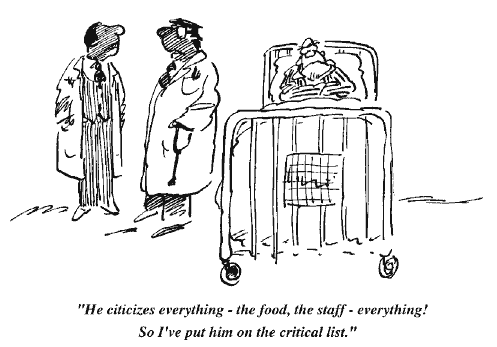
Assignment 4. Complete the sentences using as many words or phrases from the list as possible.
Example: I feel ill, fit, ...
| Тип | |
| 1. I feel |
|
| 2. You must have |
|
| 3. I've got |
|
| 4. Be careful you don't catch |
|
| 5. You need to see |
|
| 6. I'm afraid it's |
|
| 7. He'll take |
|
| 8. You've sprained |
|
| 9. She's |
|
| 10. It feels |
|
- a headache
- ill
- sore
- measles
- an operation
- fit
- an injection
- her to hospital
- your ankle
- an aspirin
- cancer
- a cold
- numb
- your doctor
- a broken wrist
- his tooth out
- mumps
- in agony
- hot
- a virus
- a sore throat
- a consultant
- inoperable
- flu
- dizzy
- incurable
- an earache
- nauseous
- in great pain
- jogging
- her temperature
- your blood pressure
- this medicine
- your wrist
- fatal
- in plaster
- stitches
- sick
- painful
- depressed
- an infection
- a surgeon
Assignment 5. Match the first part with the second part of these sentences.
|
|
Assignment 6. Phrasal verbs and idioms. Complete the second sentence so that it is as similar in meaning as possible to the first, using the word given. Do not change this word.
1. I had to have a tooth extracted last week. (out)
I had my .
2. Has he recovered from his illness yet? (over)
Has ?
3. He took care of you while you were ill. (after)
He .
4. You've gained a lot of weight since I last saw you! (on)
You've .
5. The drugs aren't having any effect now. (off)
The effect .
6. After fainting he regained consciousness after a few minutes. (round)
Having .
7. He caught flu and had to have time off work. (down)
He .
8. She has had a lovely baby girl and is feeling fine. (birth)
She has .
9. Since her heart attack, my mother has not been at all well. (poor)
Ever .
10. Michelle often has terrible headaches. (from)
Michelle .
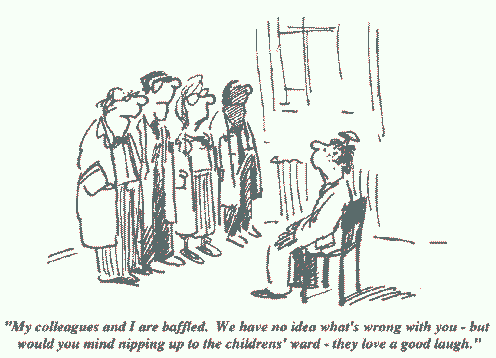
Assignment 7. Translate the following sentences into English. Use the words and expressions from the Active Vocabulary section.
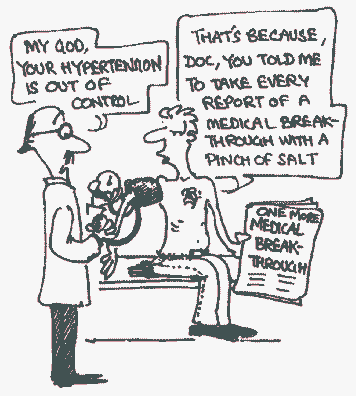
6.3. Reading Improvement
Assignment 1. Read the passage below. For each paragraph, choose the most suitable heading from the list which follows. There is one extra heading you do not need to use. In the Cambridge First Certificate, the time for this exercise would be 15-20 minutes.
PROCESSED FOOD
F. Tea and coffee bad for you. G. Processed food may be bad for you. H. Doctor's argument not logical.
1. ...
After the cigarette manufacturers, it has become the turn of the food processors to suffer the attacks of those who would have us lead a healthy life. Sometimes you have the feeling that almost everything you eat is liable to damage your brain, clog your arteries, ulcerate your stomach, or impact your intestine. On the other hand, it is certainly true that there is nothing like reading the list of ingredients on the back of a cereal packet or a pot of jam to put you off your breakfast.
2. ...
One dietician writes of pork pies as follows: "People wouldn't buy a pork pie if chemicals had not been designed into them. A pork pie can contain as much as 50 per cent of highly saturated fat which is bad for the heart and arteries. A perfectly good pork pie could be made from reasonable ingredients but it is cheaper to make it with additives because less meat is then needed. The additives in the pie do little harm in themselves. The fat is made acceptable by a perfectly safe emulsifier. Added colour makes the fat look like meat. The additives in it deceive our senses and persuade us to eat too much fat. Even if the additives themselves are considered to be relatively safe, the nutritional consequences are appalling."
3. ...
Since a study by Johns Hopkins Medical Centre, Baltimore, in the mid-eighties, coffee has been on everyone's blacklist. According to the study: "Regardless of the measure of coffee consumption used, analyses found that heavy coffee drinkers were almost three times more likely to have coronary disease than were non-drinkers. Even one or two cups of coffee a day appear to be associated with a small extra risk of heart disease - a one-third increase over non-drinkers." The one piece of good news appears to be that the risk decreases rapidly once a person stops drinking coffee.
4. ...
Few arguments create greater passion among medical experts than the supposed link between diet and heart disease. Some doctors, however, refuse to accept any connection between the two. They have argued that diets which cut back on dairy produce, although unlikely to cause physical harm, could lead to malnutrition, particularly among children. They are appalled that breakfast, that traditional British meal, should be under attack by the spectre of disease. Come between some doctors and their bacon and eggs and feelings will run high.
5. ...
The nutritionists have fought back. They remain convinced that sugary, fatty foods lead to preventable ill health. One doctor argues that a fibre-rich diet is only of use to those who suffer from diabetes. Rubbish, say the nutritionists, and go on to point out that "over one third of British adults are constipated. At least one in seven takes laxatives. And dietary fibre is of proven value in the treatment of constipation."
6. ...
Yet another doctor argues that dental decay should really be seen as a disease which results from a lack of fluoride. What we need to do is clean our teeth like crazy, have them coated with sealants, and take fluorides daily. The nutritionist blasts back by pointing out that you might as well say that headaches are caused by a lack of aspirin.
7. ...
What we do know is that nutrition does affect health. Too little food and too much food are both bad for you. In Britain, poor boys tend to be two inches shorter on average than rich boys.
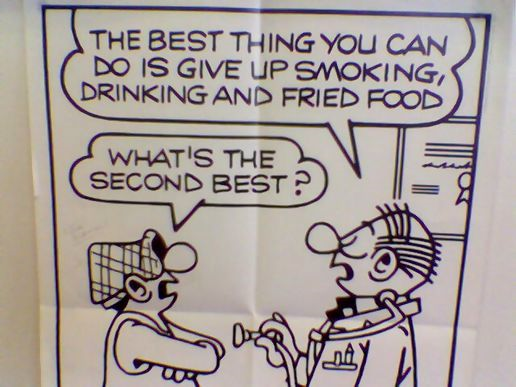
Assignment 2. Before reading the text below make a list of things which make you feel depressed. While reading compare your list of depression triggers to those mentioned in the text. Then answer the questions.
Biggest Depression Triggers and How to Turn Them Off
It’s downright scary: More than 20 million Americans can expect to suffer from depression in the coming year. But you don’t have to be one of them if you’re alert to the events and situations that can turn the blues into something more serious. Here, the 10 most common depression triggers — and what to do to prevent them from dragging you down.
Depression trigger #1: Losing a job
Why: In addition to causing financial stress, losing a job can jeopardize your sense of identity and feelings of self-worth. Unemployment and financial stress also strain marriages and relationships, bringing conflict that compounds stress and unhappiness.
Who’s most vulnerable: Statistics show that the older you are or the higher you were paid, the longer it’s likely to take to find work again. Also, those employed in downsized industries and fields, such as the auto industry, may have to retrain or start over in a new field, which can be frightening and can undermine self-confidence.
What helps: Connect with others in the same situation, whether it’s through a job skills class, training program, or job-search support group. Also, if you can afford it, use a career counselor or coach to help you create a plan, stay accountable, and feel supported. Experts also recommend building a support network by reaching out to friends and colleagues and setting up regular events throughout the week. The more you can structure your time with lunches, walks, and other get-togethers, the better. Try signing up for a morning exercise class or schedule regular morning walks to get you going each day.
If time goes by and it doesn’t look like you’re going to find a replacement job quickly, consider volunteering. It’s not only a way to boost your self-esteem and get out of the house but it’s also great for learning new skills and making new connections.
Depression trigger #2: “Empty nest” syndrome
Why: Two of the hardest things to deal with are loss and change, and when a child leaves home you’re suddenly hit with both, all at once. “Your entire routine changes, from the minute you wake up in the morning to the moment you go to bed at night,” says Celestino Limos, dean of students at Lewis & Clark College in Portland, Oregon. “Parents tend to focus on all the practical details of getting a child ready for college, but they’re unprepared for how much the rhythm of their own lives changes from day to day.”
Who’s most vulnerable: Women seem to suffer more acutely than men, perhaps because their self-identity is more closely associated with being parents, experts say. But men can suffer an acute sense of loss as well, and they may be less prepared for the onslaught of emotions. Those who are divorced or otherwise single are much more likely to be lonely once the kids are gone, but married couples may also find themselves struggling, particularly if the marriage is rocky or they’ve developed a tag-team approach to family life and don’t share many activities and interests. Parents of only children are also more vulnerable.
What helps: Plan in advance. Parenting experts suggest that parents begin exploring independent interests during their child’s last year of high school. Sign up for a class one night a week, or subscribe to a travel magazine and think about trips you might want to take.
When your child leaves home, give yourself a few weeks of quiet time to grieve, but don’t spend too much time alone. Set up regular events you can look forward to. Organize weekly walks with friends, join a book group, or sign up for a yoga, pilates, or dance class. Plan your weekends ahead of time, so you’re not caught off guard with time heavy on your hands. Try something completely new, such as a cooking or language class. When you discover a new interest or passion, having more time available becomes a good thing rather than a liability.
Depression trigger #3: Alcohol abuse
Why: Recent research backs up what addiction and depression experts have long argued: Alcohol abuse and depression are often linked in what’s called a “dual diagnosis” or, colloquially, “double trouble.” The reason for this complicated interaction is the effect alcohol has on mood. When you stop into your local tavern for a cold one, you might think you’re staving off the blues with some camaraderie and relaxation. But alcohol acts as a depressant in the central nervous system, triggering depression in those who are susceptible.
Who’s most vulnerable: Those already prone to depression or those prone to overusing alcohol are at greatest risk. In either group, the combination of alcohol abuse and depression is dangerous. According to studies, between 30 and 50 percent of alcoholics suffer from major depression. And the relationship works the other way too: Studies have found that alcohol use causes relapse in people with depression, and that when people with depression drink they’re more prone to suicide.
What helps: Cut back on drinking and seek help for alcohol abuse or addiction. “There’s a reason we’ve got the stereotype of the weepy drunk,” says Liliane Desjardins of Pavillion International, a treatment center in Texas. “Alcohol triggers a mood crash.” But people who drink too much rarely attribute their misery to drinking, she adds. Instead they blame it on other people and factors.
There’s only one solution: Cut back and see if, over time, you feel better. If you repeatedly promise yourself or others not to drink and your efforts fail or your drinking brings other negative consequences into your life, you may need help to stop. Alcoholics Anonymous and other 12-step programs are effective for some people. Others need the physical restriction and concentrated services of a residential alcohol rehabilitation facility or the supervised medical detox of an inpatient program. No matter what type of alcohol treatment program works for you, you’ll find it has the additional benefit of preventing depression.
Depression trigger #4: Illness
Why: When you’re diagnosed with a serious illness, it changes your sense of what’s possible in the present and affects your outlook for the future. Finding out you have diabetes, cancer, or another condition can set in motion a chain of events that profoundly alters your sense of yourself, your relationships, and your expectations for what life may hold in store. “People call diagnosis of a serious illness a ‘wake-up call,’ but often it’s more like a slap in the face,” says Gloria Nelson, a senior oncology social worker at Montefiore-Einstein Medical Center in New York. “Nothing is as it seemed even a few days ago, which can be disorienting and terrifying.” Pain and fatigue are physical symptoms, but they take an enormous emotional toll as well.
Who’s most vulnerable: At highest risk are those diagnosed with cancer, Alzheimer’s, COPD (chronic obstructive pulmonary disease), multiple sclerosis, Parkinson’s, chronic pain, or any other debilitating condition.
What helps: A support group. “I can’t say it strongly enough – no one is going to understand what you’re going through like your fellow patients,” says Nelson. “Your spouse, your friends, your family – they all love you and support you, but they can’t really ‘get it’ like others going through the same thing.”
Advocating for yourself to obtain effective treatment is important, too. If you aren’t getting the answers or help you need from your doctor, ask for a second opinion or referral to a specialist. For many conditions, such as cancer, a social worker can be a valuable addition to your team, offering access to additional resources the doctor may not tell you about. In some circumstances, a patient advocate can be valuable in helping you pursue aggressive or experimental treatment.
True or false?
6.4. Writing Enhancement
Assignment. The following test contains 15 spelling mistakes. Edit the text, spell the words correctly.
HEALTH BENEFITS OF LAUGHTER
She writes that the new field of gelotology is exploring the benefits of laughter. It was brought to the public’s awareness in Norman Cousins’ memoir Anatomy of an Ilness. Cousins found that comedies, like those of the Marx Brothers, helped him feel better and get some pain-free sleep. That’s because laughter helps the pituitary glend release its own pain-suppressing opiates.
What can laughter do?
• Lower blood presure.
• Increase vascular blood flou and oxygenation of the blood.
• Give a workout to the diafragm and abdominal, respiratory, facial, leg, and back musles.
• Reduce certain stress hormons such as cortisol and adrenaline.
• Increase the response of tumour- and disaese-killing cells such as Gamma-interferon and T-cells.
• Defend against respiratory infections – even reducing the frequency of colds – by imunoglobulon in saliva.
• Increase memory and learning; in a study at Johns Hopkins University Medical School, humor during instruction led to increased test scores.
• Improve alertness, creativity, and memory.
Humor and creativity work in similar ways, says humor guru William Fry, M.D., of Stanford University – by creating relationships between two disconnected items, you engage the whole braine.
Humour works quickly. Less than a half-second after exposure to something funny, and electrical wave moves through the higher brain functions of the serebral cortex. The left hemisphere analyzes the words and structures of the joke; the right hemisphere “gets” the joke; the visual censory area of the occipital lobe creates images; the limbic (emotional) system makes you happier; and the motor sections make you smile or laugh.
So let’s laugh. What makes you laugh? Tell us your favrite funny movie, or how about a good joke?
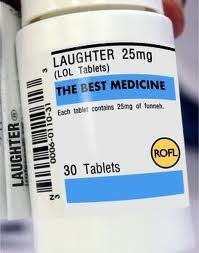
6.5. Speaking Reinforcement
Assignment 1. Sort out the following questions and answers into two columns according to who pronounced them – the doctor or the patient. Then order them so that the dialogue makes sense.
|
Make up a similar dialogue.
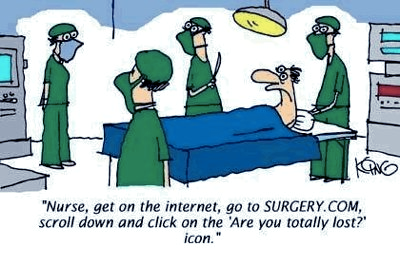
Assignment 2. Tell your partner about your recent visit to the doctor using some of the ideas for discussion below. Your partner should ask questions to get more information.
- when did you go
- why did you go
- where did you go
- what kind of treatment did you receive
- did you have a follow-up visit
Assignment 3. Pair work-discussion
Use your imagination and express sympathy to your partner in a number of situations (your partner should tell you about the situations listed below). Continue the conversation by asking questions to get more details.
- getting fired from a job
- parents’ divorce
- being dumped by your girlfriend/ boyfriend
- failing an important test
Assignment 4. Pair work-Role Play.
Working with a partner, role play the situation, using the information below. The roles: A doctor, a patient.
The patient has the following symptoms or problems mentioned in the table belowe. The doctor should:
- ask what the problem is
- ask how long it has lasted
- ask if the patient has done or eaten anything unusual lately
- make a recommendation for treatment
| The patients’ problems and symptoms | The doctor’s treatment |
Cold: Runny nose, cough, muscle aches |
Bed rest, drink fluids (orange juice), prescription cold medicine |
Fever: Hot forehead, headache, shivering |
Bed rest, alcohol rub, aspirin |
Upset stomach: Vomiting, stomach pain, nausea |
Take antacid |
Back pain: Pain in lower lumbar region |
Bed rest, massage, heating pad, take analgesic (pain pill) |
Head ache: Pain in head, at temples |
Bed rest, aspirin |
Skin burn (from hot water): Pain at site of burn, red skin, blisters |
Cool site with cold water, apply aloe or other skin burn ointment |
Broken finger: Extreme pain, lack of mobility |
Set finger in cast, pain pill |
Sore throat: Pain in throat, difficulty swallowing |
Gargle with salt water, take throat lozenges |
Allergies: Runny noose, sneezing, watery, itchy eyes |
Take allergy pills |